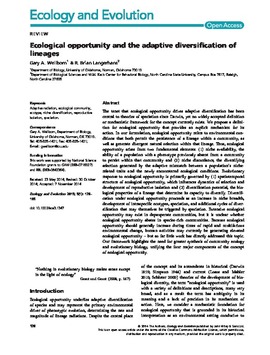| dc.contributor.author | Wellborn, Gary A. | |
| dc.contributor.author | Langerhans, R. Brian | |
| dc.date.accessioned | 2015-01-22T16:35:42Z | |
| dc.date.accessioned | 2016-03-30T15:31:18Z | |
| dc.date.available | 2015-01-22T16:35:42Z | |
| dc.date.available | 2016-03-30T15:31:18Z | |
| dc.date.issued | 2014-12-17 | |
| dc.identifier.citation | Wellborn, Gary A. and R. Brian Langerhans. Ecological opportunity and the diversification of lineages. Ecology and Evolution 2015; 5(1): 176–195. | |
| dc.identifier.uri | https://hdl.handle.net/11244/14057 | |
| dc.description.abstract | The tenet that ecological opportunity drives adaptive diversification has been central to theories of speciation since Darwin, yet no widely accepted definition or mechanistic framework for the concept currently exists. We propose a definition for ecological opportunity that provides an explicit mechanism for its action. In our formulation, ecological opportunity refers to environmental conditions that both permit the persistence of a lineage within a community, as well as generate divergent natural selection within that lineage. Thus, ecological opportunity arises from two fundamental elements: (1) niche availability, the ability of a population with a phenotype previously absent from a community to persist within that community and (2) niche discordance, the diversifying selection generated by the adaptive mismatch between a population's niche-related traits and the newly encountered ecological conditions. Evolutionary response to ecological opportunity is primarily governed by (1) spatiotemporal structure of ecological opportunity, which influences dynamics of selection and development of reproductive isolation and (2) diversification potential, the biological properties of a lineage that determine its capacity to diversify. Diversification under ecological opportunity proceeds as an increase in niche breadth, development of intraspecific ecotypes, speciation, and additional cycles of diversification that may themselves be triggered by speciation. Extensive ecological opportunity may exist in depauperate communities, but it is unclear whether ecological opportunity abates in species-rich communities. Because ecological opportunity should generally increase during times of rapid and multifarious environmental change, human activities may currently be generating elevated ecological opportunity – but so far little work has directly addressed this topic. Our framework highlights the need for greater synthesis of community ecology and evolutionary biology, unifying the four major components of the concept of ecological opportunity. | en_US |
| dc.description.sponsorship | Supported by National Science Foundation grants to GAW (DEB-0716927) and RBL (DEB-0842364). University of Oklahoma Libraries and Biological Station assisted with publication charges. | en_US |
| dc.language | en_US | en_US |
| dc.relation.ispartofseries | Ecology and Evolution 2015;5(1): 176–195 | |
| dc.relation.uri | http://onlinelibrary.wiley.com/enhanced/doi/10.1002/ece3.1347 | |
| dc.rights | Attribution 4.0 International (CC BY 4.0) | |
| dc.rights.uri | https://creativecommons.org/licenses/by/4.0/ | |
| dc.subject | Biology, Ecology. | en_US |
| dc.subject | Adaptive radiation | en_US |
| dc.subject | Ecological community | en_US |
| dc.subject | Ecotype | en_US |
| dc.subject | Niche diversification | en_US |
| dc.subject | Reproductive isolation | en_US |
| dc.subject | Speciation | en_US |
| dc.title | Ecological opportunity and the adaptive diversification of lineages | en_US |
| dc.type | Article | en_US |
| dc.description.peerreview | Yes | en_US |
| dc.description.peerreviewnotes | Ecology and Evolution maintains the highest standards of peer review while increasing the efficiency of the process. All research articles published in the journal will undergo full peer review, key characteristics of which are:
• All research articles submitted directly to the Journal are initially evaluated by the Editor-in-Chief; articles found appropriate for the Journal will be reviewed by at least two suitably qualified experts.
• All publication decisions are made by the Editor-in-Chief on the basis of the reviews provided.
• Members of the editorial board lend insight, advice and guidance to the Editor-in-Chief generally and assist in decision making on specific submissions.
• The managing editor and editorial assistant provide administrative support to ensure Ecology and Evolution maintains the integrity of peer review and delivers rapid and efficient publication to authors and reviewers.
http://onlinelibrary.wiley.com/journal/10.1002/%28ISSN%292045-7758/homepage/ProductInformation.html | en_US |
| dc.identifier.doi | 10.1002/ece3.1347 | en_US |

